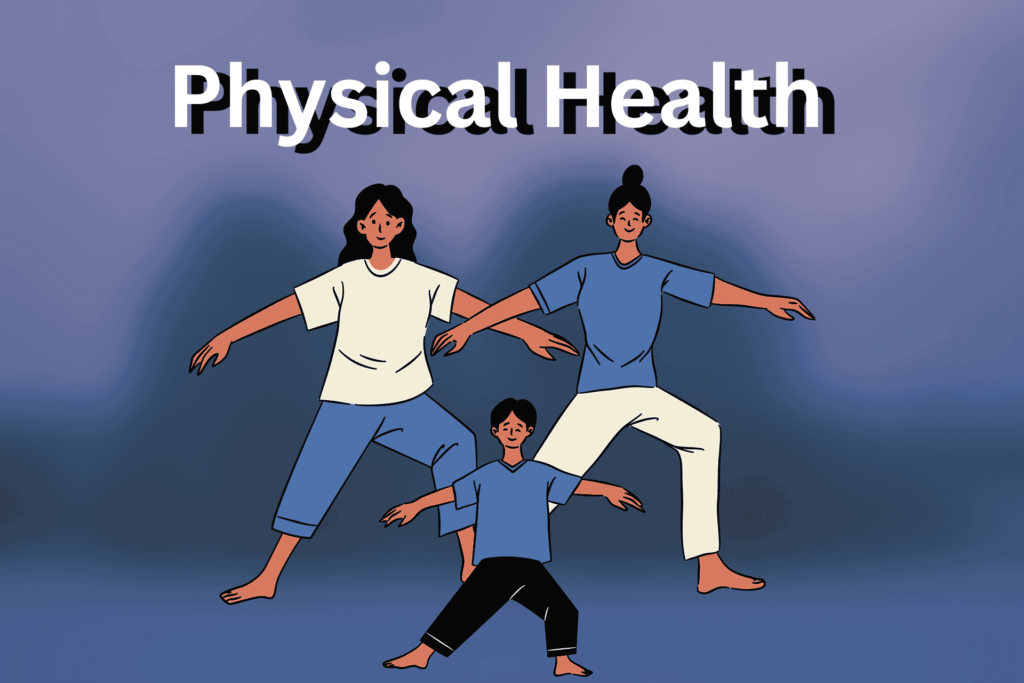Physical health is the condition of your body, including its ability to function normally and perform regular activities without extreme exhaustion or physical stress. It encompasses not only the absence of disease or chronic conditions but also the presence of fitness, strength, endurance, flexibility, and mental freshness. Maintaining proper physical health is crucial for overall well-being. It can be achieved through actual lifestyle choices, regular exercise, a balanced diet, sufficient sleep, and managing potential risks like injuries or substance use.
Energy levels
- Strength and endurance
- Flexibility and mobility
- Healthy body weight and BMI
Normal blood pressure, blood sugar, and cholesterol levels
Why is Physical Health Important?
Good physical health has countless benefits. Here are some key reasons why it should be your top priority:
1. Enhances longevity
Maintaining physical health can reduce the risk of chronic illnesses such as heart disease, diabetes, and cancer, increasing your chances of living a longer life.
2. Improve Mental Health
A healthy body contributes to a healthy mind. Exercise, for example, releases endorphins—your brain’s “feel-good” chemicals—that reduce stress, anxiety, and depression.
3. Upgrade Quality of Life
When you’re physically healthy, you can do more, travel more, work better, and enjoy your hobbies and relationships without limitations. Healthy individuals are more likely to be energetic, have better moods, and enjoy their daily activities.
4. Boost Immune Function
A fit and well-nourished body can fight infections more effectively and recover faster.
The Pillars of Physical Health
Four main components support physical health. Let’s break them down:
1. Nutrition
“You are what you eat” isn’t just a saying—it’s the truth. The food you consume directly affects your body’s ability to function, repair, and protect itself.
Tips for Better Nutrition:
- Eat a balanced diet rich in fruits, vegetables, whole grains, lean proteins, and healthy fats. Focus on nutrient-rich foods and stay healthy.
- Avoid excessive sugar and sugary foods, processed foods, and trans fats
Stay hydrated by drinking enough water throughout the day - Limit salt and refined carbohydrates
Remember: Food is fuel. Choose foods that nourish your body, not just please your taste buds.
2. Physical Activity
Exercise is the cornerstone of physical fitness. It strengthens your heart, lungs, muscles, and bones while also improving flexibility and balance. Engaging in activities you enjoy.
Types of Physical Activity:
- Aerobic exercises: walking, running, swimming, cycling
- Strength training: lifting weights, resistance bands, bodyweight exercises
- Flexibility exercises: yoga, stretching
- Balance exercises: tai chi, balance drills
Goal: Aim for at least 150 minutes of moderate aerobic activity or 75 minutes of vigorous activity per week, plus strength training twice a week.
Even a 20-minute daily walk can make a big difference.
3. Sleep and Rest
Your body repairs and restores itself during sleep. Poor sleep affects not only your energy but also your immune system, mood, memory, and metabolism.
Tips for Better Sleep:
- Get 7–9 hours of quality sleep per night
- Maintain a regular sleep schedule
- Avoid screens before bedtime
Create a calm, dark, and quiet sleeping environment
Don’t underestimate rest. If your body is tired, listen to it.
4. Preventive Healthcare
Preventive health is all about taking action before problems arise. This includes:
- Regular health checkups
- Vaccinations
- Dental visits
- Screenings (like blood pressure, cholesterol, cancer checks)
- Managing stress and mental well-being
Prevention is always better (and cheaper) than a cure.
The Connection Between Physical and Mental Health
Physical and mental health are deeply connected. When you’re physically unwell, it affects your mood and brain function. Likewise, stress or depression can lead to physical symptoms like headaches, fatigue, and digestive issues.
Exercise, proper sleep, and nutritious food are not only good for your body—they’re powerful tools for mental resilience.
Challenges to Physical Health in Modern Life
Let’s be honest: it’s not always easy to stay healthy. Here are a few common barriers:
- Sedentary lifestyle: Sitting for long hours at desks or screens
- Poor diet choices: Fast food and junk snacks are often more accessible
- Lack of time: Busy schedules leave little room for self-care
- Chronic stress: Work, family, finances—all add up
But the good news? You don’t need a perfect lifestyle. You just need a better one than yesterday.
How to Start Your Physical Health Journey
Here are simple, actionable steps to take today:
- Start small: Add a 10-minute walk to your daily routine
- Meal prep: Cook more at home, choose whole foods
- Stretch often; Especially if you sit for long periods
- Drink water: Keep a bottle with you at all times
- Track progress: Use a journal or app to record workouts, meals, or sleep
- Get support: Join a fitness group, partner with a friend, or follow a coach online
Physical health is a lifetime commitment, not a 30-day challenge.
Why does physical health matter
- Overall wellbeing
- Reduce the risk of disease
- Improved quality of life
- Better coping mechanisms
How to improve physical health
- Exercise regularly
- Eat a balanced diet
- Get an adequate diet
- Get enough sleep
- Manage stress
- Practice safe sex
- Avoid tobacco and excessive alcohol
- Schedule regular checkups
Final Thoughts
Physical health is the greatest achievement in your life. Without it, everything becomes complicated and harder.. The best part is that taking care of your body doesn’t require extreme changes or expensive treatments. It starts with a little change in your daily routine and, done consistently.
Whether you’re a teenager, a parent, or a senior citizen, it’s never too early or too late to invest in your physical well-being.
So take a step today. Walk a little. Eat a little better. Sleep a little deeper.
And start now—your future will reflect it.


